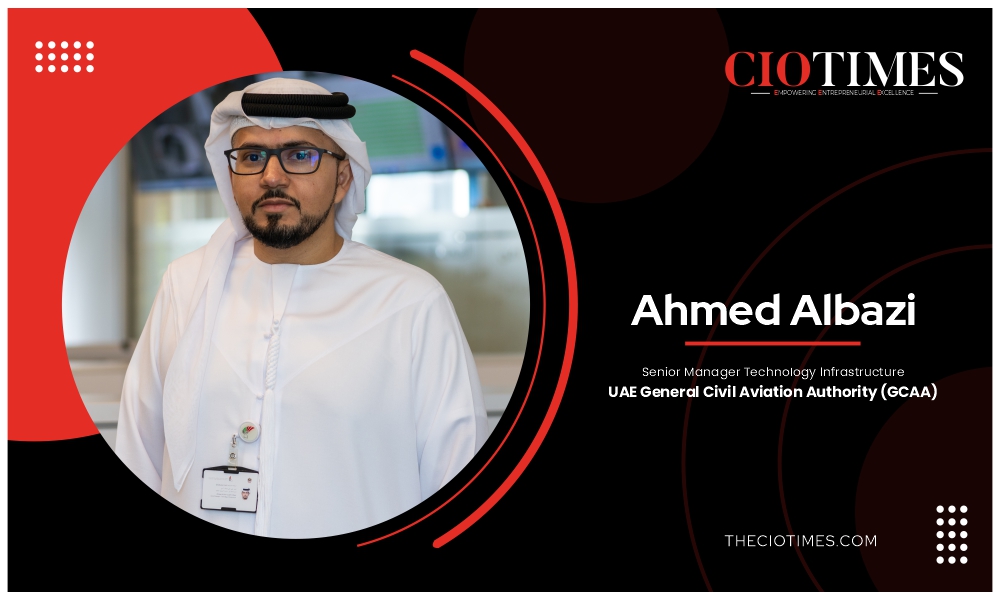Aeronautical authorities are one of the most interconnected and technology-dependent sectors in the world. At the center of this ecosystem stands the General Civil Aviation Authority (GCAA), a national body responsible for spearheading, overseeing, and enabling safe and secure air travel. Its importance extends far beyond regulatory compliance. It shields lives, ensuring operational efficiency and sustained growth of global connectivity. At the helm of these critical responsibilities is Ahmed Ali Al Bazi Al Nuaimi, Senior Manager at the UAE General Civil Aviation Authority (GCAA).
A certified CISA, PMP, and ITIL professional, Ahmed is widely recognized as a people-first technology strategist whose work in IT infrastructure and cloud transformation has reshaped mission-critical environments across sectors. He graduated from the GCAA Leadership Development Program in May 2024, and shortly after, completed an executive course at The Wharton School, University of Pennsylvania (June–August 2024), where he gained valuable insights into leading and managing high-impact teams—principles he has successfully applied in his current role.
Most recently, Ahmed completed the UAE government’s AI initiative, part of the “1 Million AI Talents” program led by the Ministry of Artificial Intelligence and the Prime Minister’s Office. He also earned his Certified Information Systems Auditor (CISA) credential, further reinforcing his commitment to excellence in governance and cybersecurity.
Driven by a deep curiosity for emerging technologies and a passion for aviation, Ahmed has evolved into a trusted and forward-thinking technology leader. His contributions are widely praised by both his team and the UAE General Civil Aviation Authority (GCAA), reflecting the impact of his leadership on the nation’s aviation infrastructure.
The Odyssey from Satellites to Strategy
Ahmed’s professional journey began in 2016 at a leading satellite telecommunications firm, where he honed his skills in infrastructure and network engineering. Operating in mission-critical environments, he developed a deep respect for system reliability and operational discipline—principles that continue to anchor his leadership philosophy today.
These formative years weren’t just about mastering the technical. They were about cultivating precision, accountability, and a mindset tuned to excellence. “Digital modernization is a strategic imperative to elevate aviation safety and efficiency while preparing for future demands,” Ahmed says—a belief forged in the trenches of uptime-driven engineering.
In 2021, Ahmed transitioned to the UAE’s General Civil Aviation Authority (GCAA), initially as a Network Engineering Specialist. His rapid ascent to leading the Technology Infrastructure section speaks volumes about his ability to blend strategic foresight with hands-on expertise. Today, he leads a team of six engineers, orchestrating digital transformation initiatives that support the backbone of the UAE’s aviation sector.
What sets Ahmed apart is not just his command of infrastructure, but his commitment to empowering people. Whether navigating complex cloud strategies or mentoring future leaders, he brings a rare blend of empathy and execution. His leadership is not about technology for its own sake—it’s about aligning innovation with purpose, and ensuring that every system, process, and person is optimized for impact.
The Digital Aviation Abode
The General Civil Aviation Authority (GCAA) of the United Arab Emirates stands as a cornerstone of the nation’s aviation ecosystem—not merely as a regulatory body, but as a dynamic hub of digital innovation. Established as a federal autonomous entity, GCAA oversees and regulates all aviation-related activities across the UAE, ensuring the highest standards of safety, security, and operational excellence.
In recent years, shares Ahmed, GCAA has embraced a bold vision: to transform aviation services through strategic technology modernization. At the heart of this transformation is the integration of Artificial Intelligence (AI), which is rapidly redefining how air traffic control and aviation infrastructure operate. AI is not just a tool—it’s a catalyst for predictive safety, operational agility, and data-driven decision-making.
By embedding AI into core systems, GCAA is optimizing workflows across its aviation services. Real-time data analytics now enable predictive maintenance, reducing downtime and enhancing reliability.
Intelligent automation supports faster, more accurate responses to dynamic airspace conditions, while machine learning models help anticipate and mitigate safety risks before they materialize. These innovations are not only elevating safety standards but also streamlining operations to meet the growing demands of global aviation.
GCAA’s commitment to digital modernization is deeply strategic. As the UAE continues to position itself as a global aviation leader, the Authority is ensuring that its infrastructure is future-ready—capable of scaling with technological advancements and evolving passenger expectations. This includes fostering a culture of innovation, investing in smart systems, and empowering its workforce to lead with both technical expertise and visionary thinking.
Strategic Leadership in Action
Ahmed joined GCAA in 2021 as a Network Engineering Specialist. His rapid rise to leading the Technology Infrastructure section speaks volumes about his ability to blend strategic foresight with hands-on expertise. Today, he leads a team of six engineers, orchestrating digital transformation initiatives that support the backbone of the UAE’s aviation sector.
His role spans daily system monitoring, incident management, strategic planning, and cross-departmental collaboration. In a sector where even minor disruptions can ripple across national borders, Ahmed’s leadership balances technical precision with organizational foresight.
Ahmed’s role involves daily coordination with his engineering team to monitor system performance, manage incidents, and ensure the continuity of aviation services. His work spans strategic planning, cross-departmental collaboration, and stakeholder engagement, all aimed at maintaining operational integrity across GCAA’s digital backbone. In a sector where even minor disruptions can have wide-reaching implications, Ahmed’s leadership balances technical precision with broader organizational foresight.
Infrastructure with Integrity
Ahmed’s leadership philosophy is rooted in integrity, transparency, and service excellence. He fosters a culture of trust and accountability, emphasizing clear communication and active listening. His approach isn’t about command and control—it’s about enabling others to lead, contribute, and grow.
“I live by Simon Sinek’s words: ‘Leadership is not about being in charge. It is about taking care of those in your charge,’” Ahmed says. “This reminds me daily that leadership is about service, trust-building, and empowering others to grow—a principle that guides me in mentoring teams, managing projects, and envisioning the future.”
GCAA’s Technology Strategy: Building a Safer, Smarter Aviation Ecosystem
The General Civil Aviation Authority (GCAA) of the UAE has positioned itself at the forefront of aviation innovation by embedding emerging technologies into its core infrastructure. Ahmed states that GCAA’s technology strategy reflects a deliberate shift toward agility, resilience, and global alignment.
Artificial Intelligence (AI) plays a central role in this transformation. By integrating AI into operational workflows, GCAA enables real-time risk assessment, predictive safety analytics, and intelligent automation across air traffic control and maintenance systems. These capabilities allow for faster, data-driven decision-making and proactive incident prevention—critical in a sector where milliseconds matter.
Cloud computing further enhances GCAA’s operational flexibility. Scalable platforms support seamless data exchange, remote system access, and rapid deployment of new services. This architecture not only improves efficiency but also ensures continuity across geographically distributed aviation assets.
Cybersecurity is treated as a foundational pillar rather than a reactive measure. GCAA employs advanced frameworks to safeguard sensitive aviation data and infrastructure against evolving threats. These protocols are continuously updated to meet international standards and anticipate future vulnerabilities.
Strategically, Ahmed notes that GCAA’s approach aligns with both the International Civil Aviation Organization (ICAO) guidelines and the UAE’s national digital transformation agenda. This dual alignment ensures compliance with global aviation norms while advancing the country’s ambition to be a leading innovation hub. By setting benchmarks in safety, operational excellence, and technological leadership, GCAA is not just modernizing aviation services—it’s shaping the future of flight in the region.
Through this integrated strategy, GCAA demonstrates how thoughtful adoption of technology can elevate public safety, streamline operations, and reinforce the UAE’s reputation as a global aviation leader.
Navigating Complexity: Building Secure, Interoperable Aviation Systems
Ahmed shares that scaling secure and interoperable systems across airports and airspace presents a distinct set of challenges for aviation regulators. The task involves integrating emerging technologies—such as AI, cloud platforms, and digital surveillance—into legacy environments without compromising availability or safety. GCAA approaches this with a systems-thinking mindset, recognizing that aviation infrastructure is deeply interconnected across national borders, operational domains, and regulatory frameworks.
Ensuring seamless interoperability requires not only technical compatibility but also alignment with global standards like those set by ICAO. At the same time, cybersecurity remains a non-negotiable priority, demanding resilient architectures that can withstand evolving threats. GCAA’s strategy emphasizes modular design, collaborative governance, and continuous adaptation—allowing systems to scale securely while maintaining operational integrity across the UAE’s dynamic aviation landscape.
Leadership to Balance Reliability with Strategic Agility
As aviation systems grow more complex and digitally driven, Ahmed believes that the role of infrastructure leaders is shifting from operational oversight to strategic enablement. Today’s leaders, he feels, must navigate regulatory demands while guiding technology adoption that enhances safety, resilience, and service continuity. At GCAA, this means balancing legacy system stability with the integration of AI, cloud, and cybersecurity frameworks. It also requires fostering cross-functional collaboration and cultivating teams that can adapt to change. The emphasis is no longer just on uptime—it’s on shaping infrastructure that supports long-term innovation, aligns with global standards, and delivers measurable impact across the aviation ecosystem.
Looking Ahead: A Vision for Aviation Technology and Leadership
The future of aviation technology, feels Ahmed, is entering a transformative phase—one defined not just by innovation, but by its ability to reshape safety, efficiency, and service delivery across global airspace. Emerging technologies such as artificial intelligence, digital twins, and unmanned aerial systems are no longer theoretical—they’re becoming operational realities. These tools offer new ways to simulate, predict, and optimize aviation environments, enabling smarter decision-making and more adaptive infrastructure. Ahmed sees these advancements as catalysts for redefining how aviation systems are designed, monitored, and evolved.
Over the next five years, Ahmed’s focus is on positioning GCAA’s Technology Infrastructure division as one of the most agile and resilient in the region. This means deepening AI integration into core operations, strengthening cybersecurity frameworks to meet global standards, and streamlining service delivery in line with the UAE’s broader smart government initiatives. The goal is not just technical excellence, but operational maturity that supports the country’s role as a global aviation hub.
Yet, Ahmed’s vision extends beyond systems and platforms. He believes that true progress lies in empowering people—building teams that are adaptable, collaborative, and driven by purpose. His leadership philosophy centers on continuous improvement, transparency, and aligning technology with real-world impact.
As the UAE continues to invest in aviation innovation, GCAA is poised to play a pivotal role in shaping the future of flight. With a clear strategy and a commitment to excellence, Ahmed and his team are helping ensure that the next chapter in aviation is not only technologically advanced—but also safe, sustainable, and human-centered.
On a Thankful Note
Ahmed concludes by saying he is humbled by the opportunities and collaborations that have shaped his journey. The future of the aviation industry is bright, he believes. He positively looks forward to contributing to GCAA’s mission and the UAE’s vision of global aviation leadership.
He signs off saying that success lies not just in forming robust systems. True success is when a leader empowers people and nurtures impactful innovation. He and his team are molding the future of aviation, leveraging one innovation at a time.
Quote: “Digital modernization is a strategic imperative to elevate aviation safety and efficiency while preparing for future demands.”
Quote: “We recently completed a major network upgrade at a critical GCAA site aimed at increasing capacity and security while future-proofing infrastructure. Despite tight deadlines and complex logistics, the project was delivered with minimal downtime through meticulous planning and teamwork, demonstrating our commitment to operational excellence.”
Read his exclusive interview to explore the full edition




